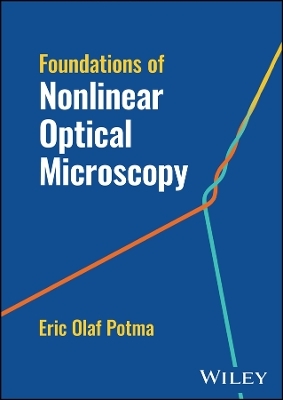
Foundations of Nonlinear Optical Microscopy
John Wiley & Sons Inc (Verlag)
978-1-119-81488-7 (ISBN)
Foundations of Nonlinear Optical Microscopy brings together all relevant principles of nonlinear optical (NLO) microscopy, presenting NLO microscopy within a consistent framework to allow for the origin of the signals and the interrelation between different NLO techniques to be understood. The text provides rigorous yet practical derivations, which amount to expressions that can be directly related to measured values of resolution, sensitivity, and imaging contrast.
The book also addresses typical questions students ask, and answers them with clear explanations and examples. Readers of this book will develop a solid physical understanding of NLO microscopy, appreciate the advantages and limitations of each technique, and recognize the exciting possibilities that lie ahead.
Foundations of Nonlinear Optical Microscopy covers sample topics such as:
Light propagation, focusing of light, pulses of light, classical description of light-matter interactions, and quantum mechanical description of light-matter interactions
Molecular transitions, selection rules, signal radiation, and detection of light
Multi-photon fluorescence and pump-probe microscopy
Harmonic generation, sum-frequency generation, and coherent Raman scattering
Senior undergraduate and graduate students in chemistry, physics, and biomedical engineering, along with students of electrical engineering and instructors in both of these fields, can use the information within Foundations of Nonlinear Optical Microscopy and the included learning resources to gain a concise yet comprehensive overview of the subject.
Eric Olaf Potma is Professor at the University of California, Irvine, in the Department of Chemistry. His research interests are quantitative imaging with nonlinear optical microscopy, nonlinear optics of individual molecules and nanostructures, and nonlinear optical scan probe microscopy.
Preface xiii
Acknowledgments xv
1 Light: Electromagnetic Radiation 1
1.1 Introduction 1
1.2 Electromagnetic Fields 1
1.3 Transverse Waves 7
1.4 Polarization States 15
1.5 Reflection and Transmission at Interfaces 19
1.6 Transformation of the Field by a Lens 23
1.7 Intensity and Energy 29
Bibliography 31
2 Focused Light 33
2.1 Introduction 33
2.2 Interference of Multiple Waves 34
2.3 The Scalar Focal Field 38
2.4 The Focused Vector Field 49
2.5 Aberrations 60
Bibliography 65
3 Ultrafast Pulses 67
3.1 Introduction 67
3.2 Optical Pulses in the Frequency Domain 68
3.3 Optical Pulses in the Time Domain 77
3.4 Measurement of Pulse Duration 88
3.5 Pulse Properties and Nonlinear Optical Signals 95
3.6 Noise 97
Bibliography 102
4 Classical Model of Nonlinear Optics 105
4.1 Introduction 105
4.2 Linear Optical Response 105
4.3 Nonlinear Optical Response 115
4.4 Properties of Nonlinear Susceptibilities 124
Bibliography 134
5 Semiclassical Model of Nonlinear Optics 137
5.1 Introduction 137
5.2 Quantum Mechanical Concepts 138
5.3 Density Matrix Formalism 147
5.4 Perturbation Expansion for the Density Matrix 152
5.5 Linear and Nonlinear Susceptibilities 159
5.6 Quantization of the Electromagnetic Field 164
Bibliography 172
6 Nonlinear Optical Signals: Molecular Transitions, Signal Radiation, Propagation, and Detection 175
6.1 Introduction 175
6.2 Molecular Transitions 175
6.3 Spatial Properties of Radiated Signal 187
6.4 Signal Radiation and Detection 205
Bibliography 211
7 Multiphoton Absorption and Fluorescence Microscopy 213
7.1 Introduction 213
7.2 Physics of Nonlinear Absorption 214
7.3 Optical Sectioning and Imaging Resolution 223
7.4 Direct Detection of Multiphoton Absorption 228
7.5 Fluorescence Detection of Multiphoton Absorption 232
Bibliography 241
8 Pump–Probe Microscopy 245
8.1 Introduction 245
8.2 Pump–Probe Signals in Microscopy 246
8.3 Electronic Pump–Probe Spectroscopy 250
8.4 Detection of Pump–Probe Signals 264
8.5 Imaging Based on the Photothermal Effect 269
Bibliography 277
9 Harmonic Generation Microscopy 281
9.1 Introduction 281
9.2 Molecular Response in Harmonic Imaging 282
9.3 SHG Imaging of Fibrillar Structures 292
9.4 THG Imaging of χ(3) Discontinuities 304
Bibliography 310
10 Sum-Frequency Generation Microscopy 313
10.1 Introduction 313
10.2 Molecular Vibrations 314
10.3 Molecular Vibrations in Sum-Frequency Generation 324
10.4 Collinear Sum-Frequency Generation Microscopy 334
10.5 Third-Order Sum-Frequency Generation Microscopy 344
Bibliography 348
11 Coherent Raman Scattering Microscopy 351
11.1 Introduction 351
11.2 The Raman Effect 353
11.3 Coherent Raman Scattering 359
11.4 Raman Spectroscopy of Lipids 373
11.5 Imaging Properties of CARS 378
11.6 Imaging Properties of SRS 387
11.7 Spectral Resolution 391
Bibliography 398
Appendix A Fourier Transform Relationships 401
Appendix B Wavenumbers Unit 403
Appendix C Power Spectral Density of White Noise 405
Appendix D Fermi’s Golden Rule 407
Appendix E Population Dynamics with Relaxation 411
Appendix F Stimulated Raman Scattering with Quantized Fields 413
Index 415
| Erscheinungsdatum | 06.03.2024 |
|---|---|
| Verlagsort | New York |
| Sprache | englisch |
| Gewicht | 1179 g |
| Themenwelt | Naturwissenschaften ► Biologie |
| Naturwissenschaften ► Chemie | |
| Technik ► Umwelttechnik / Biotechnologie | |
| ISBN-10 | 1-119-81488-X / 111981488X |
| ISBN-13 | 978-1-119-81488-7 / 9781119814887 |
| Zustand | Neuware |
| Haben Sie eine Frage zum Produkt? |
aus dem Bereich


